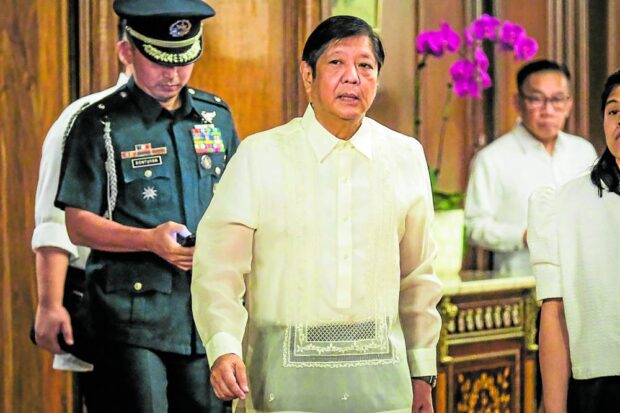
Ferdinand Marcos Jr. FILE PHOTO
MANILA, Philippines — President Ferdinand Marcos Jr. has issued an executive order creating an office that would implement his administration’s economic programs while ensuring that the country transforms into a top investment destination.
In a statement on Monday, the Presidential Communications Office (PCO) confirmed that Marcos signed Executive Order (EO) No. 49, creating the Office of the Special Assistant to the President for Investment and Economic Affairs (OSAPIEA) under the Office of the President.
According to Marcos’ order, there is a need to ensure the effective integration, coordination and implementation of the various government investment and economic policies and programs.
“There is a need to further strengthen the existing mechanisms for formulation, coordination and implementation of the Government’s economic initiatives, plans, policies and programs, as well as to establish a robust monitoring system to ensure a holistic and cohesive approach to addressing the diverse economic challenges currently confronting the nation,” the President said in the EO.
OSAPIEA will be headed by a Special Assistant to the President for Investment and Economic Affairs (SAPIEA), with the rank of a Secretary.
Presidential Adviser on Investment and Economic Affairs Frederick Go will take over the role.
PCO said that OSAPIEA is expected to provide the Chief Executive timely and relevant advice on economic matters and possible areas of investment like combating inflation and maintaining food security.
“Among the functions of the OSAPIEA head include assisting the President by providing him timely, relevant and strategic advice on economic matters and concerns, including among others, inflation, food security, and the increasing prices of key commodities,” PCO said.
“The office will also take charge of making sure investment pledges made are realized and come to fruition,” it added, referring to pledges obtained by President Marcos during his several trips to foreign countries.
EO. 49 states that SAPIEA will chair the Economic Development Group (EDG), while heads of the National Economic and Development Authority and the Department of Finance (DOF) are vice chairpersons.
“The SAPIEA shall work with the EDG, and identify the priority programs, activities and projects (PAPs) in the Philippine Development Plan (PDP) 2023-2028, as well as monitor, review and evaluate the progress of priority initiatives and PAPs of the administration,” PCO said.
“Other functions include identifying problem areas in the implementation and submit to the President a comprehensive report on such matters, including their status, and ensure timely execution, as well as close monitoring of the impact on identified targets of priority economic initiatives and PAPs,” PCO added.
Over different foreign trips, Marcos has secured investment pledges from companies eager to do business in the Philippines. Last November, it was announced that Marcos and the Philippine delegation that flew to the United States were able to secure $672.3 million worth of investment pledges (P37.17 billion)
This was broken down by PCO into $400 million in the telecommunications sector; $250 million in semiconductor and electronics; $20 million in pharmaceutical and health care; $2 million in artificial intelligence for weather forecasting; and $300,000 in renewable energy.
READ: Marcos brings home $672M in investment pledges from US
Then in July, PCO also confirmed after Marcos’ trip to Malaysia that that an airline company is looking to invest $1 billion in expanding operations in the Philippines, while a consortium between a local and Malaysian company is looking to bring in P3 billion worth of rail projects.
READ: $285-M investment pledges from state visit to Malaysia — Bongbong Marcos
Marcos is currently in Japan — his second visit to the country in just a year — for the 50th anniversary of the Association of Southeast Asian Nations (Asean)-Japan relations. Reports indicated that the President was able to secure P14 billion worth of investments during the trip.